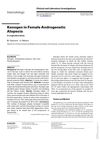 12 citations,
August 2013 in “Facial Plastic Surgery Clinics of North America”
12 citations,
August 2013 in “Facial Plastic Surgery Clinics of North America” Hair transplantation is the only permanent solution for female pattern hair loss and can greatly improve quality of life with careful planning.
Dermoscopic features can help distinguish female androgenetic alopecia from telogen effluvium and healthy controls.
 4 citations,
August 2020 in “Journal of Cosmetic Dermatology”
4 citations,
August 2020 in “Journal of Cosmetic Dermatology” QR 678 and QR678 Neo treatments are effective for hair loss in women with PCOS.
 7 citations,
December 2020 in “Dermatologic Therapy”
7 citations,
December 2020 in “Dermatologic Therapy” Injections with 0.5% minoxidil effectively treat female hair loss, increasing hair density and thickness.
 40 citations,
December 2004 in “Dermatology”
40 citations,
December 2004 in “Dermatology” Kenogen increases with hair loss in women.
 May 2023 in “International Journal of Trichology”
May 2023 in “International Journal of Trichology” A witch-hazel-based 5% minoxidil solution is effective and safe for women with hair loss who didn't respond to regular minoxidil, especially if they're sensitive to propylene glycol.
1 citations,
May 2016 in “Hair transplant forum international” The best dot density for scalp tattoos gives women with hair loss a natural look and high satisfaction.
 November 1972 in “PubMed”
November 1972 in “PubMed” Antiandrogens can help treat female pattern hair loss.
 July 2021 in “International Ophthalmology”
July 2021 in “International Ophthalmology” Female hair loss patients more likely to have dry eye and gland issues.

Two nutritional supplements improved hair growth and reduced hair loss in women with hair loss conditions.
 13 citations,
September 1986 in “Archives of Dermatology”
13 citations,
September 1986 in “Archives of Dermatology” Women with more 3α,17β-androstanediol glucuronide compared to sex hormone binding globulin are more likely to have female pattern baldness.
 14 citations,
September 1986 in “Archives of Dermatology”
14 citations,
September 1986 in “Archives of Dermatology” Women with low SHBG levels and a high 3a-diol G to SHBG ratio are likely to experience female pattern baldness, possibly due to a slight excess of androgens affecting sensitive hair bulbs.
 27 citations,
December 2005 in “Journal of Cosmetic Dermatology”
27 citations,
December 2005 in “Journal of Cosmetic Dermatology” Niacin derivatives may increase hair fullness in women with hair loss.
 6 citations,
December 1997 in “Journal of The American Academy of Dermatology”
6 citations,
December 1997 in “Journal of The American Academy of Dermatology” CTE can distort results in hair growth trials, so exclude it carefully.

Drinking sweetened tea and late bedtimes increase the risk of hair loss in women.

Drinking sweetened tea and poor sleep habits increase the risk of hair loss in women.

Drinking sweetened tea and poor sleep habits may increase the risk of hair loss in women.

Drinking sweetened tea and late bedtimes increase the risk of hair loss in women.

Drinking sweetened tea and poor sleep increase the risk of hair loss in women.
 43 citations,
November 2019 in “American Journal of Clinical Dermatology”
43 citations,
November 2019 in “American Journal of Clinical Dermatology” FAGA diagnosis uses blood tests and trichoscopy, with treatments like topical minoxidil, oral anti-androgens, and hormone-modulating drugs.
 21 citations,
November 2012 in “Plastic and Reconstructive Surgery”
21 citations,
November 2012 in “Plastic and Reconstructive Surgery” Both genetic and lifestyle factors significantly affect female hair loss.
 8 citations,
March 2021 in “Medicina-lithuania”
8 citations,
March 2021 in “Medicina-lithuania” PRP treatment may promote hair growth and improve hair density in women with AGA, but more research is needed.
 January 2005 in “Korean Journal of Psychosomatic Medicine”
January 2005 in “Korean Journal of Psychosomatic Medicine” Women with alopecia often experience high levels of anxiety and depression, needing psychiatric help.
 October 2022 in “Más dermatología”
October 2022 in “Más dermatología” Early diagnosis and treatment are crucial for managing female hair loss effectively.
 149 citations,
June 2002 in “British Journal of Dermatology”
149 citations,
June 2002 in “British Journal of Dermatology” Minoxidil works better for female hair loss, but cyproterone reduces scalp oiliness and causes menstrual issues.
 September 2023 in “Cureus”
September 2023 in “Cureus” Dr. SKS Hair Booster Serum effectively treats hair loss in women with PCOS.
 July 2018 in “Journal of College of Medical Sciences-nepal”
July 2018 in “Journal of College of Medical Sciences-nepal” Women with certain types of hair loss may have low iron levels.
 January 2014 in “Journal of the Korean Society of Design Culture”
January 2014 in “Journal of the Korean Society of Design Culture” The study confirmed that changes in hair structure in women with hair loss conditions matched what is taught in beauty college trichology courses.
 2 citations,
December 2018 in “International journal of current microbiology and applied sciences”
2 citations,
December 2018 in “International journal of current microbiology and applied sciences” The dog recovered from hypothyroidism and regrew its hair after two months of treatment.
 5 citations,
December 2014 in “Medicine and Pharmacy Reports”
5 citations,
December 2014 in “Medicine and Pharmacy Reports” Ciproterone acetate improves hair regrowth and acne in most female patients.




























